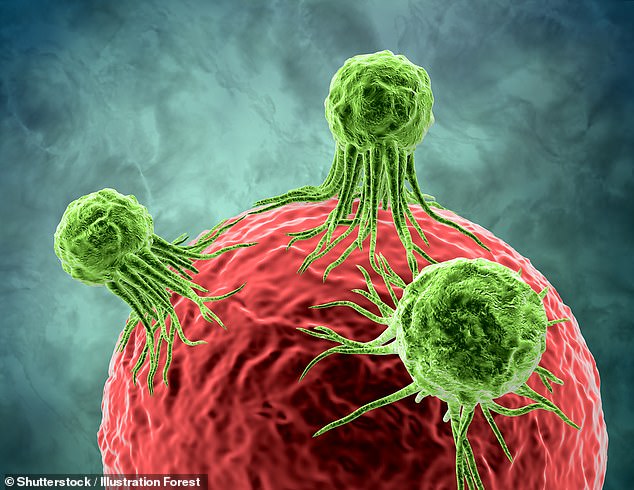Doctors hail blood tests that predict whether breast cancer will return years before it shows up on scans
A blood test can predict whether breast cancer will return years before the cancer appears, allowing treatment to start before it becomes incurable.
The ‘ultra-sensitive’ test can pick up traces of a tumor’s DNA before a full relapse occurs, while the tumor is much more difficult to treat.
It was found to be 100 percent accurate in predicting which patients would see their cancer return – up to three and a half years earlier than conventional scans.
Doctors say it could have a ‘transformative effect’ on breast cancer outcomes, saving many of the 11,500 lives lost to the disease each year in Britain.
The ‘liquid biopsy’ uses whole genome sequencing to detect genetic errors in a patient’s DNA, which can be a sign of cancer.
A blood test can predict whether breast cancer will return years before the cancer appears, allowing treatment to start before it becomes incurable (Stock Image)
Researchers from the Institute of Cancer Research (ICR), London, conducted the trial on 74 women with different types of early breast cancer.
The test looks for 1,800 mutations in the blood released by cancer cells – known as circulating tumor DNA (ctDNA).
It successfully detected this ctDNA in eleven women – all of whom had their cancer return. None of the other women relapsed.
Blood samples were tested at the time of diagnosis, and then again after surgery and chemotherapy. The tests were then repeated every three months for the following year and six monthly for five years.
On average, the blood test detected cancer 15 months before symptoms appeared or showed up on scans – the current method used by the NHS to monitor cancer survivors.
The earliest was 41 months before a scan confirmed the diagnosis, according to results presented at the American Society of Clinical Oncology conference in Chicago.
Anyone who showed signs of tumor DNA at any time after surgery was found to have a higher risk of future relapse and worse overall survival.
Lead researcher Dr. Isaac Garcia-Murillas of the ICR said the findings “lay the foundation for better post-treatment monitoring and potentially life-prolonging treatment in patients.”

Doctors say it could have a ‘transformative effect’ on breast cancer outcomes, saving many of the 11,500 lives lost to the disease each year in Britain (Stock Image)
He added: ‘Breast cancer cells can remain in the body after surgery and other treatments, but there may be so few of these cells that they are undetectable on follow-up scans. These cells can cause patients to relapse many years after their initial treatment.
‘Ultra-sensitive blood tests could provide a better approach for the long-term monitoring of patients whose cancer is at high risk of returning.’
Other blood tests have also been developed that look for DNA evidence of recurring cancer. However, these only look for 16 to 50 mutations in gene regions directly linked to diseases.
This new test, developed by the American company Personalis, is about 100 times more sensitive.
Dr. Garcia-Murillas added: ‘A more sensitive test is very important for this group of patients with early breast cancer, as they typically have very low levels of cancer DNA in their blood.’
The women who relapsed in the study survived an average of just over five years.
Researchers said further studies are underway to see if patients can start treatment as soon as signs of a recurrence are detected, potentially preventing the disease from spreading and becoming incurable.
